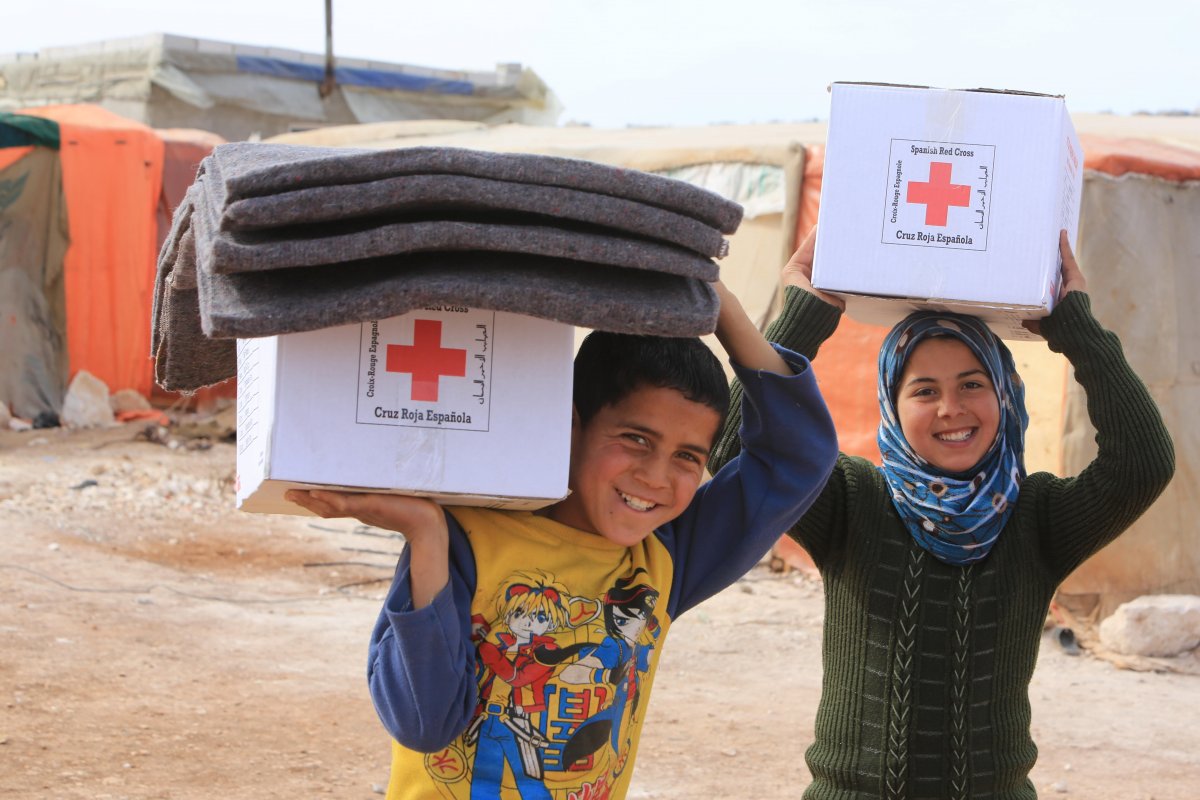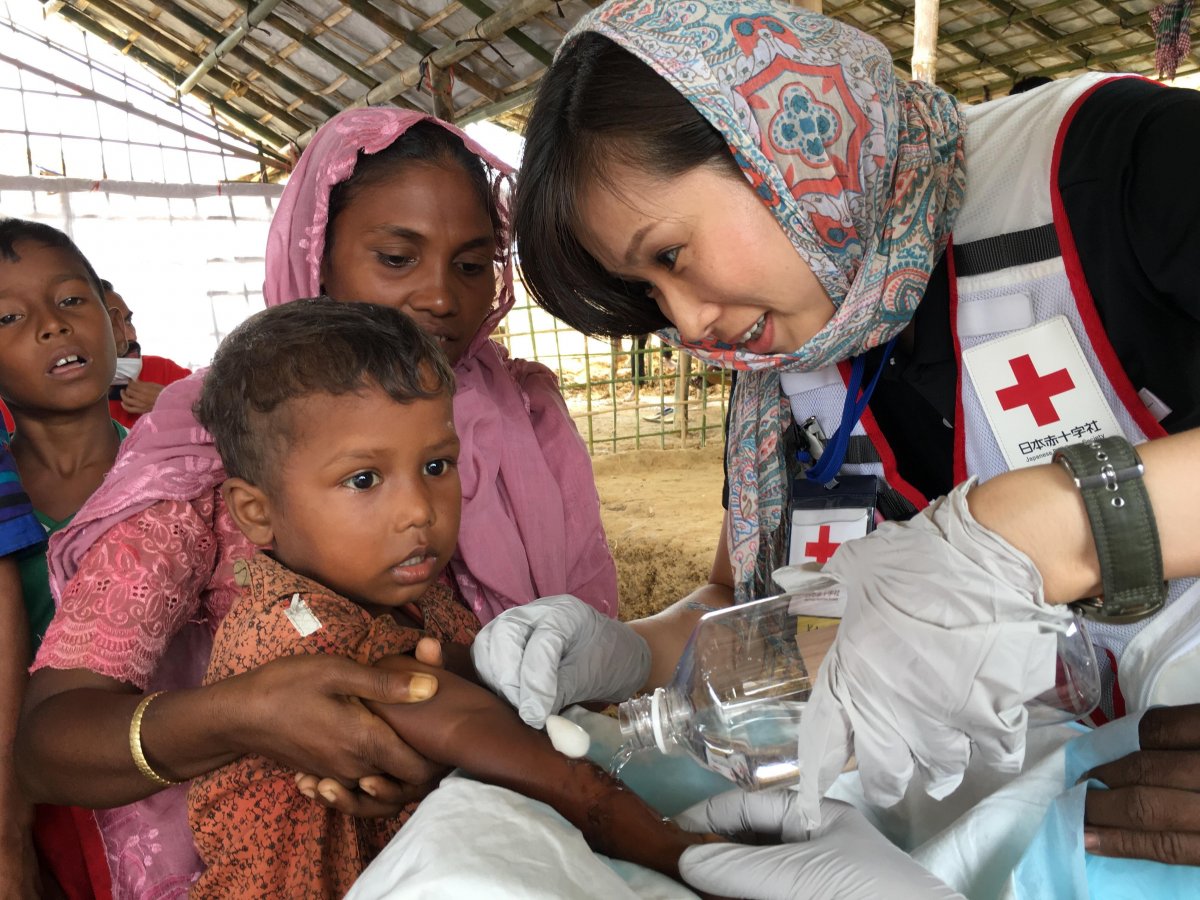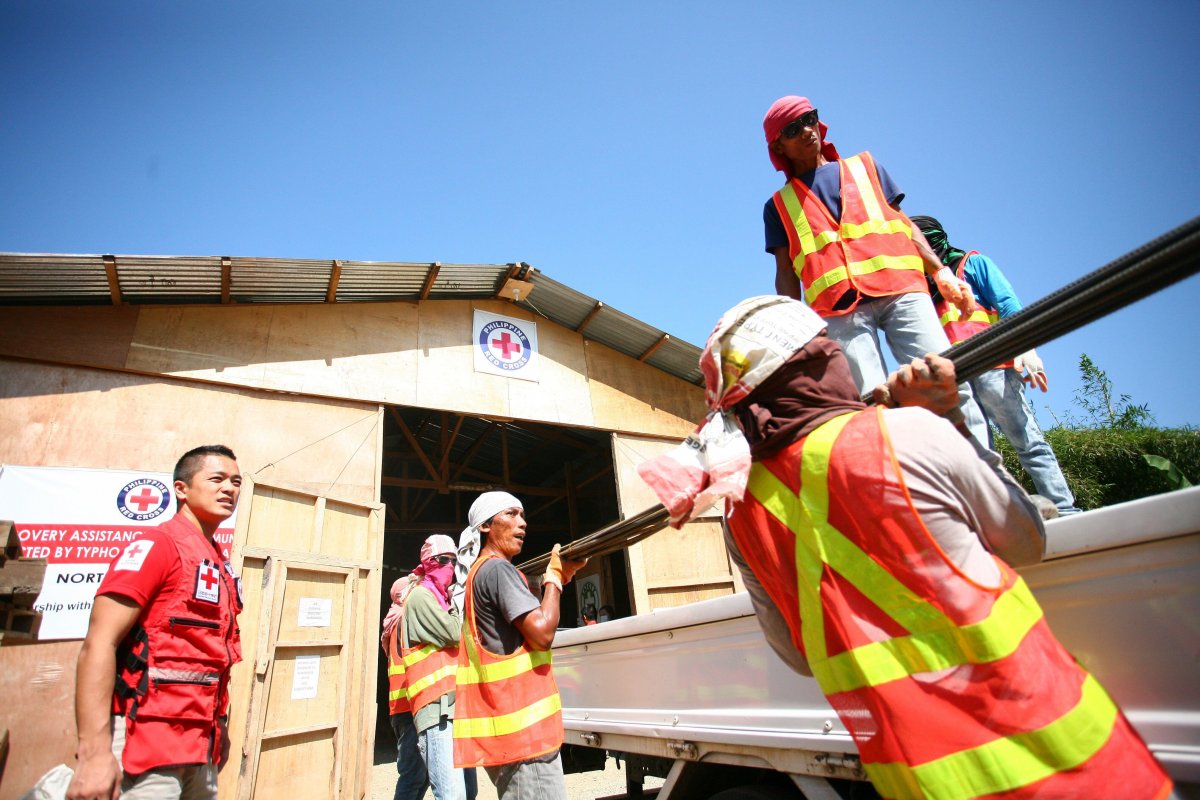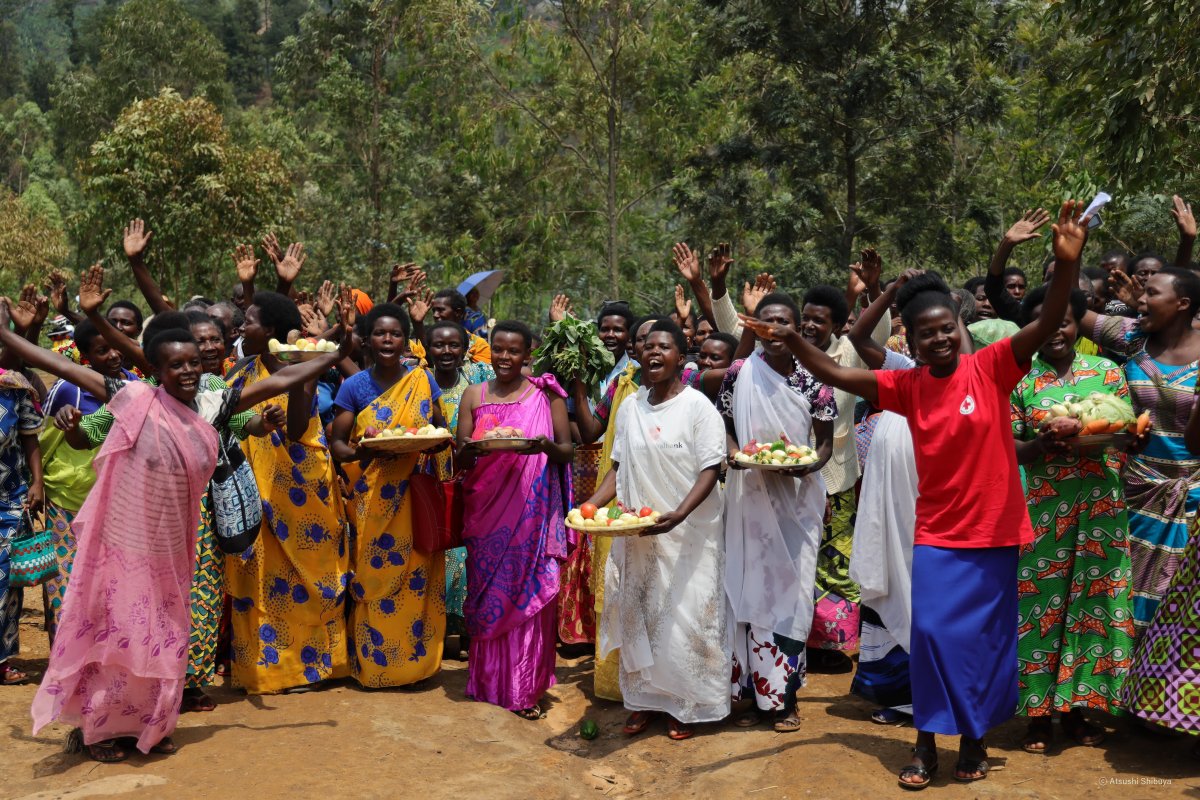International Activities
Today, the humanitarian environment has continued to change dramatically. Climate change has triggered natural disasters and created new weather patterns that are unpredictable and severe, threatening communities in every region of the world. Protracted conflicts, political instability, economic crisis, and widening inequalities have exposed millions of people to intolerable risks, forcing more people to flee their homes than at any point since the end of the Second World War. The causes and consequences of humanitarian crises are interlinked, and in the absence of political solutions and a unified response from the international community, many of them would only worsen.
The JRCS, with its robust national/local network of health promotion and disaster management, will focus on the following three international core business, i.e. A. B. C. in executing its collective power of humanity as one of the strong partners of the Red Cross Red Crescent Movement. These are derived from the aforementioned Operational Focuses to realize our Vision, but simply translated to fit better into the international trend and environment in response to global humanitarian needs.
Alleviate human suffering - disaster/crisis management
We engage in disaster/crisis management including natural (e.g. earthquakes, floods, typhoons, volcano eruption), human-generated disasters (i.e. conflicts and displacement) and epidemics by providing funds, in-kind assistance, trained delegates, and Emergency Response Units (ERU). The JRCS has two Basic Health Care ERU sets of equipment on standby in Japan and abroad (in Singapore, as of 2020), and it is preparing itself to have one Hospital ERU that is designed to provide multi-disciplinary care at a referral level in emergencies. Staffs with suitable professional backgrounds, including medical professionals from the JRCS hospitals, are trained in special ERU courses.
Emergency Relief
Whenever a large scale disaster or conflict occurs, it is imperative to rapidly provide emergency assistance to the affected population to meet their basic needs, such as food, medicine or shelter. The JRCS, as a member of the International Red Cross and Red Crescent Movement (the Movement), considers it its primary responsibility to provide support for relief activities.
The IFRC has an emergency response framework in order to provide immediate support to the Red Cross/Red Crescent National Society in the affected country. Under this framework, the JRCS stands ready to provide relief items, provide funds, and deploy rapid response personnel and medical services (see below explanation of an ERU) upon a request from the affected National Society through the IFRC.
The IFRC and the ICRC derives support (voluntary funds) for its emergency response operations through their Emergency Appeals. The JRCS responds to their request with a cash and/or in-kind contribution whenever it launches. In fiscal year 2019, the JRCS funded 26 Emergency Appeals contributing a total of JPY198 million.
An Emergency Response Unit (ERU) is a team of trained technical specialists, ready to be deployed at short notice, which uses pre-packed sets of standardized equipment. ERUs are designed to be self-sufficient for one month and can operate for up to four months. The ERUs are vital in the IFRC's disaster response system. The JRCS owns its Emergency Clinic ERU (formerly known as Basic Health Care ERU) since 2001. In addition, the JRCS is developing its Emergency Hospital ERU, which shall be ready for deployment from 2021. The JRCS ERU delegates consist of medical personnel, technicians and administrators who received additional training. They provide immediate health care service to the disaster affected population based on its needs. Further information on ERUs is available at: https://www.ifrc.org/ERU
Logistics Preparedness

The logistics stock preparedness is essential in covering the initial needs in the immediate aftermath of any disaster. The JRCS has pre-positioned and maintained emergency response stockpile in the IFRC warehouse located in Kuala Lumpur, Malaysia, which is sufficient to meet the needs of 10,000 households in the Asia Pacific region. It is made up with 10 relief items such as blankets, tarpaulins and jerrycans. The JRCS also supports local Red Cross/Red Crescent National Societies to procure relief materials, and assists them in training local relief personnel, staff and volunteers, involved in water supply and sanitation. This enhances the emergency response capabilities in the disaster-prone countries.
Build back better and safer - resilience building
We promote disaster preparedness with the quality and quantity of the work which we do before - not only when, and not only after - disaster strikes. Disaster risk reduction is one of the main avenues leading to a more resilient world. As we aim for more resilient and capable communities in the aftermath of disasters, we promote the principle of "Building back better and safer", supporting communities to recover and rebuild in a way that addresses the risks that triggered the crisis in the first place, thus becoming more resilient.
Recovery Assistance
From emergency relief to recovery assistance, the JRCS has adapted a seamless, all-encompassing set of processes to aid in the recovery of disaster-stricken areas, whether the cause is human or natural. The JRCS aims to alleviate suffering by providing medical support; it helps people in affected areas deal with illness in addition to other misfortunes to which they are typically vulnerable. Furthermore, the JRCS works to help those affected by a disaster to rebuild their lives, and strives to improve the managerial capacity of National Red Cross Societies in countries affected by a disaster. The JRCS aids in the restoration and reconstruction of damaged houses and medical facilities. It also helps local National Red Cross and Red Crescent Societies stockpile relief supplies, train volunteers, and organizes workshops to promote disaster preparedness in local communities. In doing so, the JRCS aims to encourage the development of efficient disaster responses in communities overseas.
Development Cooperation
Recognizing the humanitarian needs of those who do not have the access to basic services, suffering from poverty, or those who are at brink of diverse risks by being exposed to the threats of conflicts, natural disasters or the impact of climate change, the Red Cross commits itself to strengthening resilience among the most vulnerable people or communities, the ability for them to stand up against hardships on their own. It is the Red Cross volunteers who lead the actions. They are always there before, during and after humanitarian crisis and act together with the people in the communities to identify risks beforehand, respond to and overcome the humanitarian challenges, and move forward. What is most important is to enable people and communities to obtain accurate knowledge and act appropriately on their own to ensure that the achievements or positive impact made to be kept even after the ending of or without receiving assistance from outside.
The JRCS has been engaged in wide range of activities to strengthen resilience of communities, in areas such as health, water and sanitation (WASH), disaster risk reduction (DRR), climate change adaptation(CCA) and livelihood together with other National Societies all over the world, particularly in Asia and Africa.
Keeping in mind our mandate to "leave no one behind", our humanitarian endeavor continues.
| The Red Cross definition of Resilience: the ability of individuals, communities, organizations or countries exposed to disasters, crises and underlying vulnerabilities to anticipate, prepare for, reduce the impact of, cope with and recover from the effects of shocks and stresses without compromising their long-term prospects " |
Humanitarian response in protracted crises
The JRCS considers it important to provide its support, based on the fundamental principles of the Movement, to vulnerable people affected by protracted humanitarian crises, where access to the affected population is not always guaranteed due to political and/or security instability. Together with the IFRC and the ICRC, the JRCS supports Red Cross/Red Crescent National Societies in the Middle East in helping refugees and internally displaced people affected by Syria Crisis. It also works with the Bangladesh Red Crescent Society in Bangladesh to ensure primary health care service and community-based health support for thousands of displaced people from Myanmar in makeshift camps.
Change minds - promotion of humanitarian values
"Saving lives, changing minds" has been the slogan for IFRC's "Strategy 2020", meaning to introduce to people's minds the humanitarian values. Changing minds is the key to strengthening humanity and disaster reduction, and we promote humanitarian values through the operations and any other opportunities, including the dissemination of International Humanitarian Law (IHL) and its practical application to the global agendas, such as the elimination of nuclear weapons. The promotion of the culture of tolerance, non-violence and diversity must also be given greater prominence. In IFRC's "Strategy 2030: A Platform for Change, Local Action, Global Reach", seven transformations are identified that are essential for our network to be prepared to respond to various challenges, to mobilize local actions to drive, and achieve our strategic goals. Its fifth transformation is to influence humanitarian action by building on evidence and experience.
Dissemination of International Humanitarian Law
Since its establishment, the Red Cross has been mandated to assist victims of war. To this day, the 1949 Geneva Conventions are the main legal for this mandate. It is thus important for the JRCS, a member of the International Red Cross and Red Crescent Movement, to disseminate international humanitarian law (IHL) and its humanitarian rules, particularly those in the four 1949 Geneva Conventions and its two 1977 Additional Protocols. The JRCS works closely with the Japanese government to disseminate IHL, particularly through the National Committee on IHL. It is through the JRCS' connections with the government, that Japan became a party to the 1977 Additional Protocols to the Geneva Conventions in July 2004.
Working towards the Elimination of Nuclear Weapons
The horrific devastation and suffering witnessed in Hiroshima and Nagasaki in 1945 by JRCS and ICRC medical staff, as they attempted to help tens of thousands of dying and wounded people, have left an enduring mark on the entire International Red Cross and Red Crescent Movement and have driven its advocacy of the prohibition and elimination of nuclear weapons over the last 75 years. Deep concern about the catastrophic humanitarian consequences of any use of nuclear weapons are i) the lack of any adequate humanitarian response capacity in the event of their use, ii) the difficulty of envisaging how any use of nuclear weapons could be compatible with the rules of International Humanitarian Law, and the need for concrete action leading to the prohibition and elimination of nuclear weapons. In order to increase the understanding of the horrific humanitarian consequences of nuclear weapons, to keep the momentum around the Treaty on the Prohibition of Nuclear Weapons (TPNW), and to enable the younger generation to take over the baton, the JRCS organized the Youth Action Forum for Red Cross and Red Crescent Movement Youth across the world in 2019. Through the Action Forum, youth learned about the immediate and long-lasting humanitarian impacts of the nuclear weapons and got in touch with the youth and other concerned peoples in Hiroshima to be motivated and inspired.
Restoring Family Links
Restoring family links refers to the maintenance and restoration of bonds between members of the same family who have become separated due to conflict, disaster, or the severing of diplomatic relations. The JRCS takes supportive measures to restore these family links through a series of enquiries and investigations, while also taking into account the emotions of the person(s) in question. The JRCS works closely with the Fire and Disaster Management Agency (FDMA) when handling cases linked to/confined within Japan. The combined efforts of these two entities allows for a cooperative system designed to investigate the safety of missing persons and restoring family links. This collaboration was first introduced in 2004 along with Japan's Civil Protection Law. Bearing in mind the various support needs in the event of a large-scale natural disaster, the JRCS is currently also in negotiation with other entities devoted to this issue.







